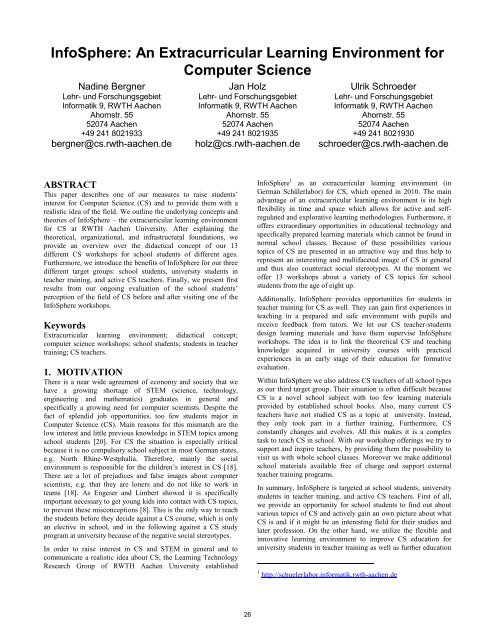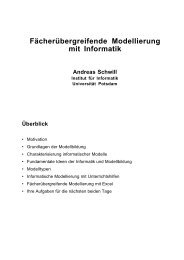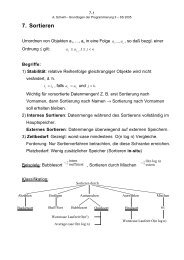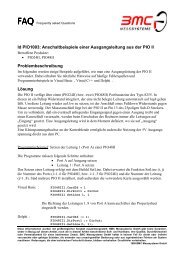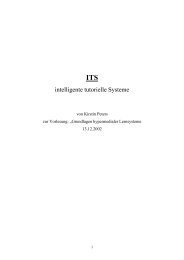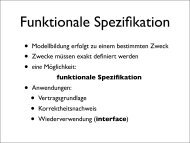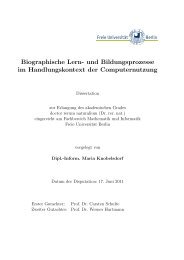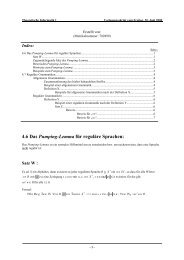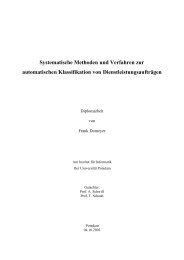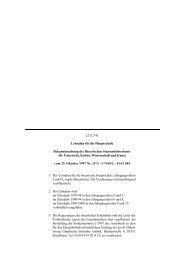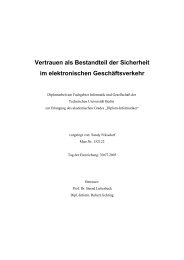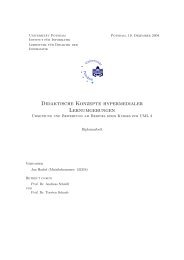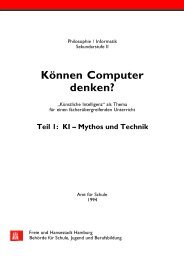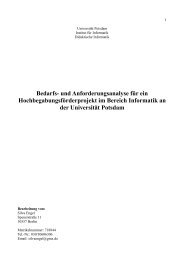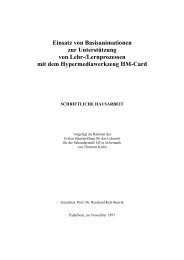Maria Knobelsdorf, University of Dortmund, Germany - Didaktik der ...
Maria Knobelsdorf, University of Dortmund, Germany - Didaktik der ...
Maria Knobelsdorf, University of Dortmund, Germany - Didaktik der ...
Create successful ePaper yourself
Turn your PDF publications into a flip-book with our unique Google optimized e-Paper software.
InfoSphere: An Extracurricular Learning Environment for<br />
Computer Science<br />
Nadine Bergner<br />
Lehr- und Forschungsgebiet<br />
Informatik 9, RWTH Aachen<br />
Ahornstr. 55<br />
52074 Aachen<br />
+49 241 8021933<br />
bergner@cs.rwth-aachen.de<br />
ABSTRACT<br />
This paper describes one <strong>of</strong> our measures to raise students’<br />
interest for Computer Science (CS) and to provide them with a<br />
realistic idea <strong>of</strong> the field. We outline the un<strong>der</strong>lying concepts and<br />
theories <strong>of</strong> InfoSphere – the extracurricular learning environment<br />
for CS at RWTH Aachen <strong>University</strong>. After explaining the<br />
theoretical, organizational, and infrastructural foundations, we<br />
provide an overview over the didactical concept <strong>of</strong> our 13<br />
different CS workshops for school students <strong>of</strong> different ages.<br />
Furthermore, we introduce the benefits <strong>of</strong> InfoSphere for our three<br />
different target groups: school students, university students in<br />
teacher training, and active CS teachers. Finally, we present first<br />
results from our ongoing evaluation <strong>of</strong> the school students’<br />
perception <strong>of</strong> the field <strong>of</strong> CS before and after visiting one <strong>of</strong> the<br />
InfoSphere workshops.<br />
Keywords<br />
Extracurricular learning environment; didactical concept;<br />
computer science workshops; school students; students in teacher<br />
training; CS teachers.<br />
1. MOTIVATION<br />
There is a near wide agreement <strong>of</strong> economy and society that we<br />
have a growing shortage <strong>of</strong> STEM (science, technology,<br />
engineering and mathematics) graduates in general and<br />
specifically a growing need for computer scientists. Despite the<br />
fact <strong>of</strong> splendid job opportunities, too few students major in<br />
Computer Science (CS). Main reasons for this mismatch are the<br />
low interest and little previous knowledge in STEM topics among<br />
school students [20]. For CS the situation is especially critical<br />
because it is no compulsory school subject in most German states,<br />
e.g. North Rhine-Westphalia. Therefore, mainly the social<br />
environment is responsible for the children’s interest in CS [18].<br />
There are a lot <strong>of</strong> prejudices and false images about computer<br />
scientists, e.g. that they are loners and do not like to work in<br />
teams [18]. As Engeser and Limbert showed it is specifically<br />
important necessary to get young kids into contact with CS topics,<br />
to prevent these misconceptions [8]. This is the only way to reach<br />
the students before they decide against a CS course, which is only<br />
an elective in school, and in the following against a CS study<br />
program at university because <strong>of</strong> the negative social stereotypes.<br />
In or<strong>der</strong> to raise interest in CS and STEM in general and to<br />
communicate a realistic idea about CS, the Learning Technology<br />
Research Group <strong>of</strong> RWTH Aachen <strong>University</strong> established<br />
Jan Holz<br />
Lehr- und Forschungsgebiet<br />
Informatik 9, RWTH Aachen<br />
Ahornstr. 55<br />
52074 Aachen<br />
+49 241 8021935<br />
holz@cs.rwth-aachen.de<br />
26<br />
Ulrik Schroe<strong>der</strong><br />
Lehr- und Forschungsgebiet<br />
Informatik 9, RWTH Aachen<br />
Ahornstr. 55<br />
52074 Aachen<br />
+49 241 8021930<br />
schroe<strong>der</strong>@cs.rwth-aachen.de<br />
InfoSphere 1 as an extracurricular learning environment (in<br />
German Schülerlabor) for CS, which opened in 2010. The main<br />
advantage <strong>of</strong> an extracurricular learning environment is its high<br />
flexibility in time and space which allows for active and selfregulated<br />
and explorative learning methodologies. Furthermore, it<br />
<strong>of</strong>fers extraordinary opportunities in educational technology and<br />
specifically prepared learning materials which cannot be found in<br />
normal school classes. Because <strong>of</strong> these possibilities various<br />
topics <strong>of</strong> CS are presented in an attractive way and thus help to<br />
represent an interesting and multifaceted image <strong>of</strong> CS in general<br />
and thus also counteract social stereotypes. At the moment we<br />
<strong>of</strong>fer 13 workshops about a variety <strong>of</strong> CS topics for school<br />
students from the age <strong>of</strong> eight up.<br />
Additionally, InfoSphere provides opportunities for students in<br />
teacher training for CS as well. They can gain first experiences in<br />
teaching in a prepared and safe environment with pupils and<br />
receive feedback from tutors. We let our CS teacher-students<br />
design learning materials and have them supervise InfoSphere<br />
workshops. The idea is to link the theoretical CS and teaching<br />
knowledge acquired in university courses with practical<br />
experiences in an early stage <strong>of</strong> their education for formative<br />
evaluation.<br />
Within InfoSphere we also address CS teachers <strong>of</strong> all school types<br />
as our third target group. Their situation is <strong>of</strong>ten difficult because<br />
CS is a novel school subject with too few learning materials<br />
provided by established school books. Also, many current CS<br />
teachers have not studied CS as a topic at university. Instead,<br />
they only took part in a further training. Furthermore, CS<br />
constantly changes and evolves. All this makes it is a complex<br />
task to teach CS in school. With our workshop <strong>of</strong>ferings we try to<br />
support and inspire teachers, by providing them the possibility to<br />
visit us with whole school classes. Moreover we make additional<br />
school materials available free <strong>of</strong> charge and support external<br />
teacher training programs.<br />
In summary, InfoSphere is targeted at school students, university<br />
students in teacher training, and active CS teachers. First <strong>of</strong> all,<br />
we provide an opportunity for school students to find out about<br />
various topics <strong>of</strong> CS and actively gain an own picture about what<br />
CS is and if it might be an interesting field for their studies and<br />
later pr<strong>of</strong>ession. On the other hand, we utilize the flexible and<br />
innovative learning environment to improve CS education for<br />
university students in teacher training as well as further education<br />
1 http://schuelerlabor.informatik.rwth-aachen.de


